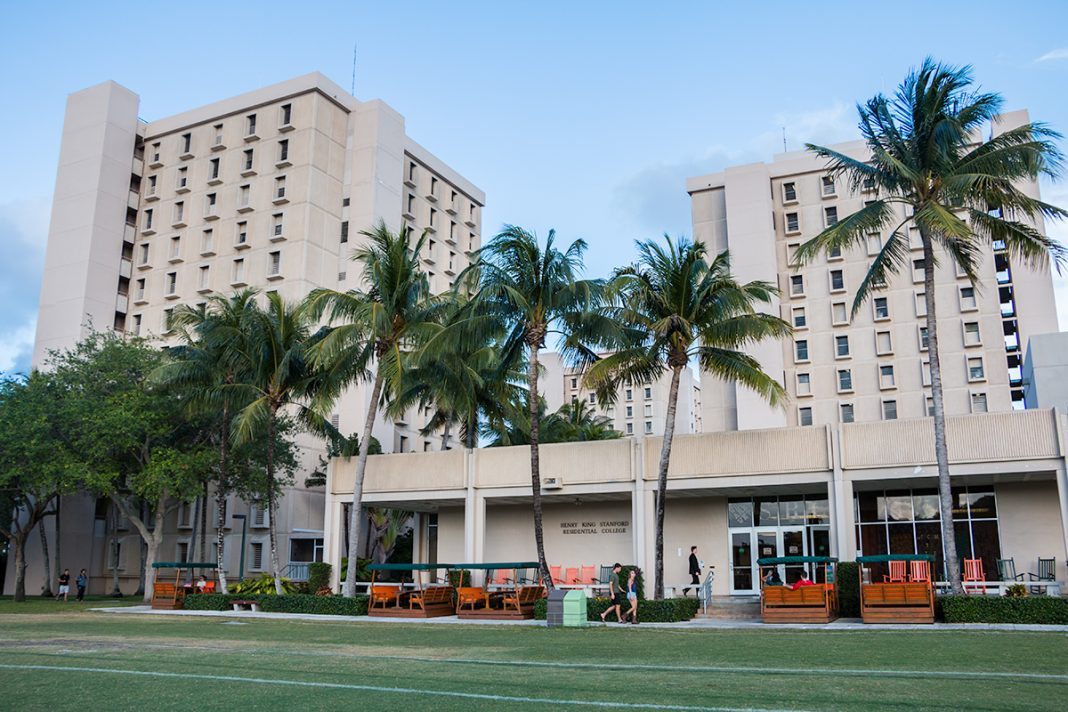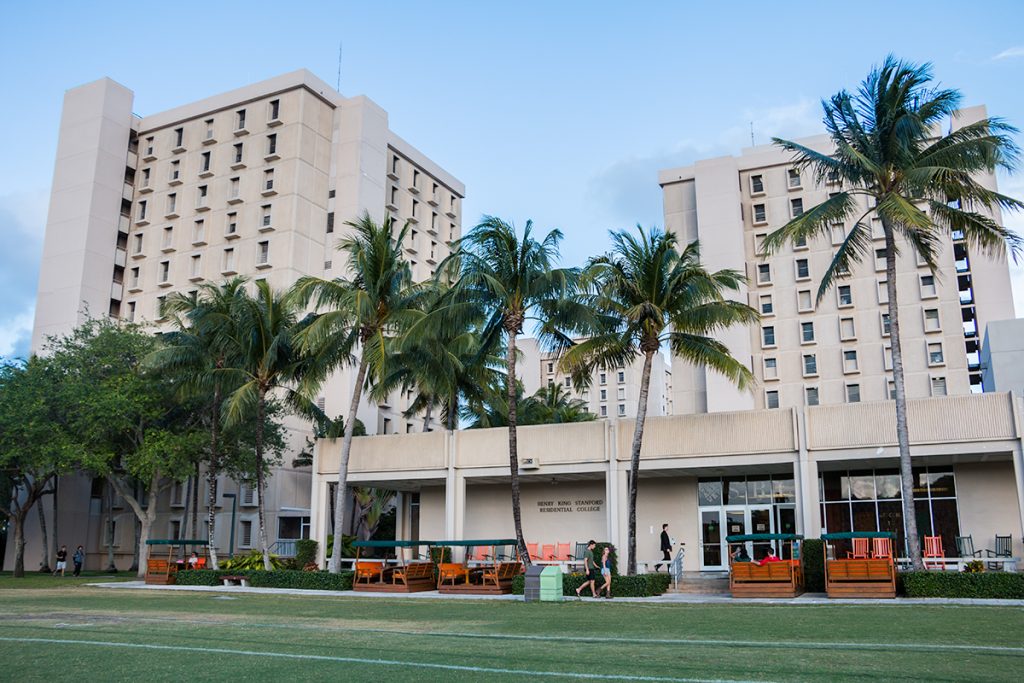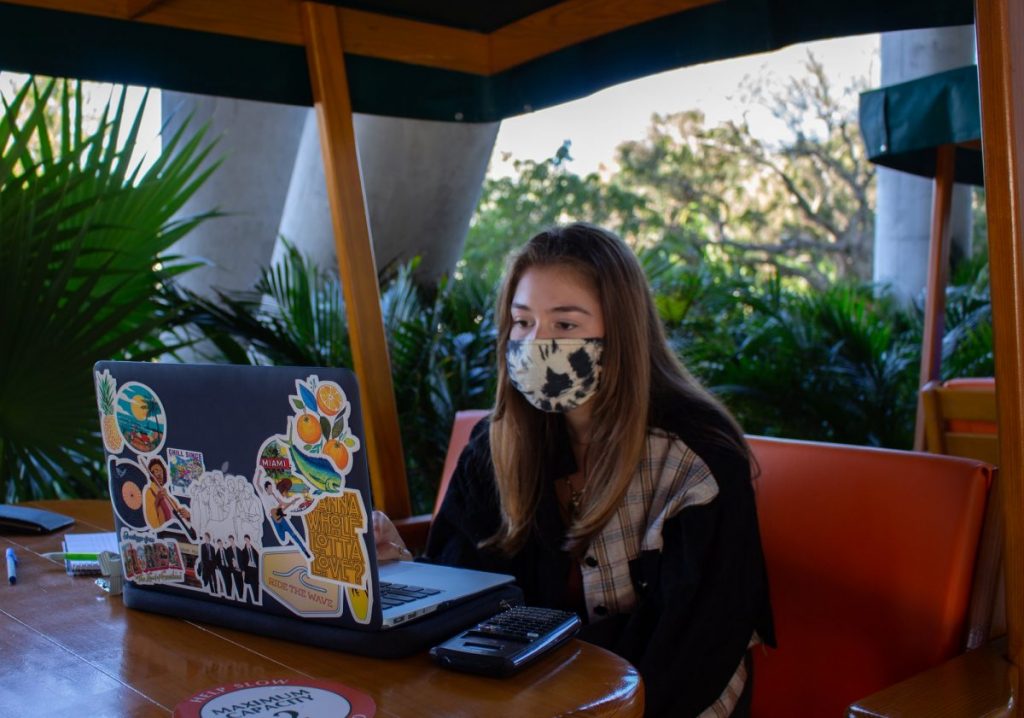

The class of 2024 arrived on campus in the fall ready to flourish in the freedoms that come with freshman year. But many residential freshmen say the pandemic, especially a midnight curfew imposed by Miami-Dade County and the University of Miami, robbed them of one of the reasons they chose to be Miami — a chance to stay out late and explore the haunts of South Beach, Wynwood and Brickell.
“I missed out on so many experiences I will never be able to have,” said Claire Kim, a sophomore finance major from Chicago. “It started off with missing the second semester of senior year, prom and then graduation. Little did I know how much it would affect my first year of college too.”
From the minute freshmen moved into their dorm rooms in the fall, the restrictions took hold: Only four students were allowed to be in a dorm room at one time, water fountains on each floor were shut off, and masks were strictly enforced throughout the entire building.
Other “Stop the Spread” safety measures for students included completing the daily symptom checker to ensure everyone has been tested for COVID in the past week. Community bathrooms in the dorms were deep cleaned three times a day and hands-free devices such as soap and paper towel dispensers were set up.
“I understand everything the school is doing completely, but that doesn’t take away from the frustration my friends and I felt this year,” said Stella Campbell, a sophomore marketing major from Los Angeles.
All residential students had a midnight curfew, which was initially set at 10 p.m. during the fall semester. The midnight to 6 a.m. curfew conformed with Miami-Dade County’s.
There are 4,199 residents living on campus, including 90 percent of first-year students, some of whom said they found the curfew especially disheartening because it ruined the first-year-of-college experience.
“I already didn’t have a high school graduation due to COVID,” said Isabella Tabio, a sophomore media management major from Orlando who lived in Mahoney Residential College. “Then I couldn’t even stay out past 10 p.m. as a college student due to COVID as well.”
One resident of the Mahoney Residential College, now-sophomore Jacoby Long, said he saw no upside to the curfew.
“It’s my first year here, and this is a pretty sucky way to start off my college life,” said Long, from Palm Beach Gardens, Florida. “I also think it’s stupid that there’s a curfew; like COVID is only going to get me after midnight or something.”
Sophomore CJ Kayfus said he believes the curfew was ineffective.
Kayfus, 18, a sophomore business management major from Wellington, Florida, said he got written up for being out past the curfew once during fall semester.
“All they did was take my name down and tell me this can’t happen two more times or else I won’t be able to stay at the dorms anymore, which makes no sense to me,” said Kayfus, a former Pearson resident. “I know people that sneak in other people that don’t even go to school here.
“A lot of the time they aren’t even checking who walks in the building,” Kayfus said. “They only care if you come in after midnight, so there’s no point in the checkers even being there if they aren’t checking Cane Cards till midnight.”
For their part, resident assistants said the curfew is in place to protect the students.
“Trying to enforce curfew restrictions as COVID fatigue and students’ desire to go out grew was challenging,” said Rachel Bergeron, a junior biochemistry major from Atlanta and an RA at Mahoney Residential College. “It was disheartening to sometimes have to discipline students for things that, in a normal year, wouldn’t be any issue.”
Apart from the curfew, many freshmen said the biggest challenge during the pandemic was finding the motivation to do well in their remote classes and making new friendships on campus.

“I only have one in-person class this semester,” said Brendan Kearns, a sophomore business major from Long Island, New York. “Even though it’s my first year, I can tell how weird and different campus is. I feel like I didn’t really get to know my professors personally, and it made me lose motivation to log onto class, honestly.”
Commuter students taking remote classes also had an adjustment, said Alexandra Cueto, a sophomore advertising major from Miami.
“As a commuter student, it’s already hard to meet people, but COVID definitely added more of a restriction,” Cueto said. “My first year, it was more about making an effort to go on campus since all of my classes were online. Thankfully, I had friends going in, and joining Greek Life also helped me meet more people.”
With only weeks remaining in spring semester, the county and the campus lifted the midnight curfew that had been in place since fall semester. On April 12, the University of Miami Department of Housing and Residential Life announced that the midnight curfew would be lifted alongside the Miami-Dade County curfew.
Students did not hesitate to make plans once they could stay out as late as they wanted.
And some freshmen said they were finally able to live the version of Miami that they fell in love with.
“The past two weeks without a curfew have been the most fun I’ve had my entire year, maybe even in my life,” Campbell said.
Campbell, like many other residential freshmen, has been celebrating the lift of the curfew. The first night the curfew was lifted she and her friends celebrated by having a karaoke night in Brickell.
“Not having to worry about it anymore is just simply immaculate,” said Melissa Hunyadi, an undeclared business major from Shelton, Connecticut.
“When I first found out that the curfew was lifted, I texted my friends and we were all so excited,” said Souleymane Bangoura, a sophomore business major from Tucson who lived in Mahoney Residential College. “We literally made plans to go out to Wynwood the following night.”
The curfew being lifted has signaled a new beginning for the class of 2024, the rising sophomores said.
“Miami is one of the most amazing places I’ve ever been to in my life,” Kim said. “The nightlife here is really something I’ve never experienced before, and I am really grateful to be able to discover more hidden gems in this city during the nighttime.”
—
Yvanna Bollanga, Alexander Munroe and Zoe Skerlos contributed to this report.






